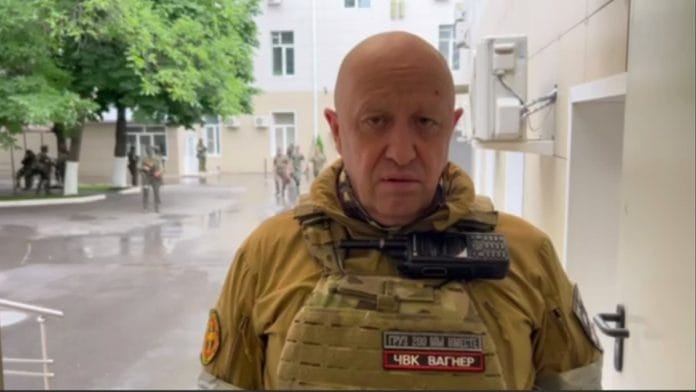New Delhi: Since he attempted a mutiny against Russia’s army brass roughly two months ago, all eyes had been on Yevgeny Prigozhin, chief of the mercenary group Wagner. Though the mutiny did not pan out as he might have hoped, many expected Prigozhin to meet the same fate as several of Russian President Vladimir Putin’s critics, who have over the past decade either died under murky circumstances or faced attempts on their lives.
Yet all seemed rosy for the Wagner chief Monday, when he took to his Telegram channel to post his first video address since the mutiny. The 62-year-old claimed that he was somewhere in Africa, “making Russia even greater on all continents, and Africa even more free”.
Barely 48 hours later, Russian state media quoted the country’s aviation agency as saying that Prigozhin was among the 10 people listed on the manifest of a private plane that went down north of Moscow Wednesday, leaving no survivors.
The Embraer aircraft, believed to be one of Prigozhin’s personal business jets, took off from Moscow for St Petersburg and was flying at 28,000 feet before it disappeared from the radar and crashed into the ground.
A second jet, also reportedly belonging to the Wagner chief and headed to St Petersburg around the same time, turned around and landed safely in Moscow. However, the Russian aviation ministry has confirmed that Prigozhin and Wagner co-founder Dmitry Utkin were listed as passengers on the jet that crashed in the Tver Region.
In the video message he posted on Telegram Monday, Prigozhin did not specify his location in Africa. Open-source investigation platform All Eyes on Wagner suggested there was no way of verifying if the video was actually shot in the continent, while also sharing information about a Prigozhin-linked aircraft arriving in Mali’s capital city, Bamako, this past weekend.
We were warned yesterday that a plane linked with #Wagner was on its way to Bamako. Here it is https://t.co/rTTWVcEJzV
— alleyesonwagner (@alleyesonwagner) August 19, 2023
In addition friends from CAR have shared with us a photo circulating in country and showing #Prigozhin allegedly in Bangui. It seems badly photoshopped and nobody has seen him in #CAR pic.twitter.com/U9i6xDLk6j
— alleyesonwagner (@alleyesonwagner) August 21, 2023
Russian media had Wednesday reported the removal of General Sergei Surovikin, nicknamed “General Armageddon”, as head of the air force. Absent from public view since Wagner’s failed rebellion, Surovikin was rumoured to have been aware of Prigozhin’s plans.
Following reports of the crash, Wagner-affiliated Telegram channel Grey Zone hailed Prigozhin as a patriot and said that he died at the hands of people they called “traitors to Russia”.
“It is obvious that Putin does not forgive anyone for his own bestial terror,” said Mykhailo Podolyak, adviser to the president of Ukraine — where Wagner has been fighting alongside Russian troops. US President Joe Biden, too, was not surprised, noting “there’s not much that happens in Russia that Putin’s not behind”.
Prigozhin’s relationship with Putin dates back decades. His mutiny is described as the biggest threat to Putin’s power since 1999, but he was known for years to be close to the Russian president — referred to as “Putin’s chef” at one time.
Also Read: Wagner Group is a shadow instrument of Russian policy, product of a ‘deny-endorse’ paradox
Decade in jail, catering & leader of a mercenary group
A restaurateur-oligarch-turned-mercenary-chief, Yevgeny Prigozhin was among Russia’s richest and most influential men.
Born on 1 June 1961, he came from humble roots in St Petersburg. He is believed to have come into Putin’s contact after being released from prison in the 1990s following a nine-year sentence for fraud and robbery.
Prigozhin subsequently started a catering business, which, by 1995, grew into a chain of restaurants and companies.
By the time Putin came to power in 1999, Prigozhin was the caterer favoured by the Russian oligarchy.
As his business prospered, Prigozhin grew closer to the Kremlin and the military, from serving at Putin’s birthday parties to catering for the president’s dinners with world leaders, including former US President George Bush, the then Prince Charles, and Jacques Chirac of France. He also secured numerous high-paying catering contracts for schools and Russia’s armed forces.
In 2014, during the annexation of Crimea, Prigozhin moved into a new business arena — guns for hire. He set up a private military group, Wagner, operating with impunity and taking on tasks seen to be too controversial for Russian armed forces. After it helped the Kremlin capture Crimea, Wagner was seen as Putin’s proxy army.
Wagner also intervened in Syria on behalf of Russia in 2015 to support Bashar al-Assad in the earlier leg of the Syrian civil war. Wagner’s military engagement had also expanded towards Africa by late 2017 with its deployment of troops in Libya, Mali, Mozambique, Burkina Faso and Sudan.
Over the past year, Prigozhin was pushed into the spotlight for Wagner’s involvement in the Russian invasion of Ukraine where the group secured rare victories for Moscow.
Though he is credited with setting up Wagner, Prigozhin denied any links to it until last year.
Differences emerge between Prigozhin & Putin
According to reports, over the past year, the Wagner chief had been sparring with Russian military leaders, holding them responsible for his troops’ deaths in eastern Ukraine.
His differences with Russian defence minister Sergei Shoigu, and Valery Gerasimov, chief of general staff of Russia’s armed forces, culminated in Yevgeny Prigozhin spearheading a short-lived mutiny on 23-24 June.
Putin had called Wagner’s actions “treasonous” and “a stab in the back”, but he was subsequently exiled to Belarus as part of a deal brokered between him and Putin by President Alexander Lukashenko of Belarus.
However, Prigozhin was spotted in Moscow on numerous occasions over the past two months and in St Petersburg during the Russia-Africa Summit last month.
(Edited by Amrtansh Arora)
Also Read: As Wagner Group’s ‘rebellion’ against Moscow fizzles, a look at the Russia-Ukraine conflict timeline






